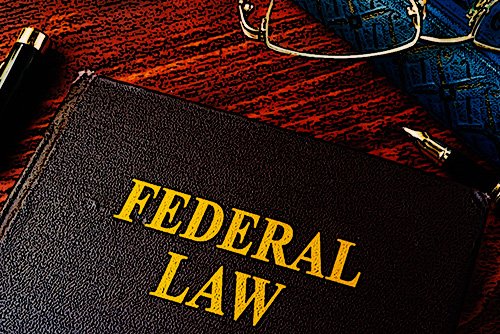
In most cases, the crime of murder is prosecuted in state courts as a state crime. But there are seven scenarios when an unlawful killing violates federal law and thus is prosecuted as a federal crime. These include when:
- the murder is of a federal judge or a federal law enforcement official (for example, an agent of the FBI, TSA, or ATF),1
- the killing is of an immediate family member of a federal law enforcement official,2
- the murder is of an elected or appointed federal official (for example, the President, a Supreme Court Justice, a member of Congress, or the murder of a federal judge),3
- the killing is committed during a bank robbery,4
- the killing takes place aboard a ship at sea (for example, on a vessel that is engaged in interstate commerce per the Commerce Clause of the U.S. Constitution),5
- the murder was designed to influence a court case,6 and
- the killing takes place on federal property (for example, on national parks or a Native American reservation).

An unlawful killing can be charged as a federal crime in the United States whenever the act breaks federal law.
First vs Second-Degree Murder
Depending on the facts of the case, a murder coming under federal jurisdiction may be charged as either:
- first-degree murder, or
- second-degree murder.
First-degree murder is punishable by the death penalty (capital punishment) or imprisonment in federal prison for life.7
Federal charges of second-degree murder are punishable by any terms of years in federal prison, as determined by the federal sentencing guidelines.
Defenses to Murder
Criminal defense lawyers can use several legal strategies to contest federal murder charges. These include showing that:
- the accused acted in self-defense.
- the defendant committed an accidental killing.
- the defendant acted by reason of insanity.
Self-defense
A defendant can try to challenge a murder charge by showing that he/she killed someone in self-defense.
This defense will work if the accused:
- believed that he/she was in “imminent danger,”
- believed that force was necessary to stop the danger, and
- used an appropriate level of force in defense.8
Accidental killing
Accident is a common legal defense in criminal cases. The defense works in murder cases if the accused can show that he/she:
- had no criminal intent to do harm,
- was otherwise engaged in lawful activity at the time of the killing, and
- was not acting negligently.9
Insanity
An accused can always assert an insanity defense to murder. The law says a person is insane if:
- he/she did not understand the nature of the act committed, and/or
- he/she could not distinguish between right and wrong.10
If successful, the defense results in the accused being admitted to a state facility for treatment.

When a federal murder law is violated, a murder charge becomes a federal charge and is handled by federal prosecutors.
State vs Federal Cases
The determination as to whether a murder charge is brought in state court or federal court is based on whether the crime violated:
- a state law, or
- a federal criminal law.
Many murder charges are prosecuted as state crimes because the allegations within the charge violate state law.
However, there are situations when the allegations within a charge violate federal law. In these situations, a murder charge becomes a federal charge and is handled by federal prosecutors.
Please keep in mind that some murders may violate both state and federal laws – which means the same act can be prosecuted in either federal court or state court, or both.
Note that it is not double jeopardy to charge a person with murder in both state and federal court, provided that his/her actions violated both state and federal laws.
Legal References:
- 18 U.S.C. Section 1114.
- 18 U.S.C. 1115b3.
- 18 U.S.C. 351.
- 18 U.S.C. 1111.
- 18 U.S.C. 2280.
- 18 U.S.C. 1512.
- 18 U.S.C. 1111b.
- See, for example, CALCRIM No. 3470 – Right to Self-Defense or Defense of Another. Judicial Council of California Criminal Jury Instructions (2017 edition). See also People v. Humphrey (1996) 13 Cal.4th 1073; and, Silva v. Roden (2014) 52 F. Supp. 3d 209.
- See, for example, California Penal Code 26 PC. See also People v. Gonzales (1999) 74 Cal.App.4th 382.
- R v M’Naghten (1843) 8 E.R. 718. See also Gutierrez v. Anglin (2013) 706 F.3d 867.
- California Penal Code 187 PC.

